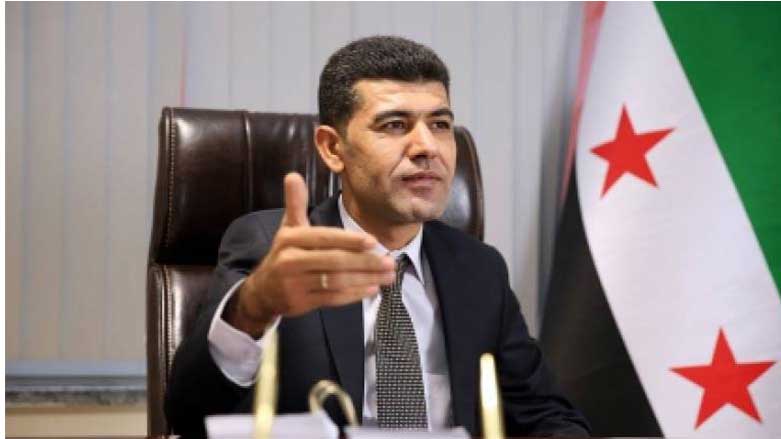Syrian opposition announces removal of Kurdish member of Syrian Negotiations Committee, but outcome remains in dispute

ERBIL (Kurdistan 24) – The President of the Turkish-backed opposition in Syria—the National Coalition of Syrian Revolution and Opposition Forces (Etilaf in Arabic)—Nasser al-Hariri, announced the removal of a member of the Kurdish National Council (KNC) from the High Negotiations Committee (HNC), which represents the Syrian opposition in the UN-sponsored talks in Geneva with the Syrian regime to determine the political future of the country.
Although the KNC is a member of the Etilaf, nonetheless, Hariri recently stated that he was replacing KNC member, Hewas Egid, on the HNC with Abdullah Fahd, an Arab member of the Etilaf.
Echoing Turkish complaints about Syria's Kurds, Hariri also appealed to the Arab League, claiming that the Kurds were dividing Syria.
However, the Arab League is strongly opposed to Ankara's expansionist policies, and last week it roundly condemned Turkey's military intervention in several Arab countries, including Syria and Iraq. It does not appear to have responded to Hariri's appeal.
The US, for its part, believes that Kurdish representation in the HNC is important, and the issue remains unresolved, despite Hariri's announcement.
KNC Rejects Hariri's Position
Mohammed Ismail, a senior leader of the Kurdistan Democratic Party–Syria (KDP-S), and a member of the KNC presidency, told Kurdistan 24 that Hariri's decision is not acceptable.
"We have sent a message of protest to the President of the Coalition, Nasser Hariri," he said. "We, as the KNC Presidency, also held an online meeting with the Coalition Political Committee and expressed our dissatisfaction."
"The United States has sent a strong message to Nasser al-Hariri and the Negotiations Committee that the KNC should be strong in the Negotiations Committee, and it will play a role in Syria's future," he added.
Ismail explained that the decision, so far, has not been revoked but neither has it been implemented. Negotiations are currently taking place among the KNC, Etilaf, and international parties, he said.
If this decision is actually implemented, the KNC will take a stance, and it has alternatives, Ismail added.
The HNC was established following the Riyadh conference of the Syrian opposition in 2015. It was founded in order to create a delegation of the Syrian military and political opposition to negotiate with the Syrian regime in the Geneva peace negotiations.
Hariri's decision, it seems, might be a reaction to the US-supported Kurdish unity talks between the Kurdish National Unity Parties (PYNK) and the KNC, as well as increased criticism from KNC officials about human right violations by Turkish-backed groups in Turkish occupied territories, such as Afrin, Tal Abyad, and Ras al-Ain (Serekaniye).
The PYNK is an umbrella organization composed of groups allied to the Democratic Union Party (PYD), the political wing of the People's Protection Units (YPG), which spearheads the US-allied Syrian Democratic Forces (SDF,) the main local partner in Syria of the US-led Coalition against ISIS.
Arab Criticism of Turkish Military Interventions
Turkey has criticized the Kurdish unity talks, and Hariri's comments echoed Ankara's stance.
"Agreements with terrorist, separatists militias" constitute a danger to the unity of Syria and the path towards a political solution, Hariri tweeted on September 2, and in a letter to the Arab League, he called for it to intervene in northeast Syria, accusing the PYD of partitioning Syria.
The PYD-led Autonomous Administration of North and East Syria (AANES) responded on September 7, condemning Hariri's statement and arguing that it represented an attempt to cover up Turkish crimes in Syria, even as the AANES reaffirmed its own commitment to Syrian unity.
Moreover, the Arab League, meeting in Cairo, where it is headquartered, strongly condemned Turkish military interventions in Syria and other Arab countries on September 9. As Egypt's Foreign Minister affirmed, Egypt "will not stand motionless in face of the Turkish greed that is especially being shown in northern Iraq, Libya and Syria."
That same day, the KNC held an online meeting with other members of the Etilaf to discuss developments in Syria, and the Etilaf reaffirmed its keenness to work with the KNC.
According to an Etilaf statement, the KNC called on the Syrian opposition to ensure the return of people who have been displaced from their homes in Afrin, Ras al-Ayn, and Tal Abyad.
They also discussed human rights violations by the PYD in the northeast of Syria.
Several organizations, such as Amnesty International, Human Rights Watch, and the UN Commission of Inquiry on Syria, have documented a variety of human rights abuses in Afrin by Turkish-backed groups.
The KNC has become increasingly critical of the human rights abuses by Turkish-backed groups, despite its membership in the Syrian opposition bloc.
The head of the KNC, Saud al-Mullah, in early September, told Kurdistan newspaper that Turkish-backed factions carried out "terrorist acts and practices, including kidnapping, torture, murder, and displacement were carried out by these factions with different names before Turkey's eyes."
Editing by Laurie Mylroie
